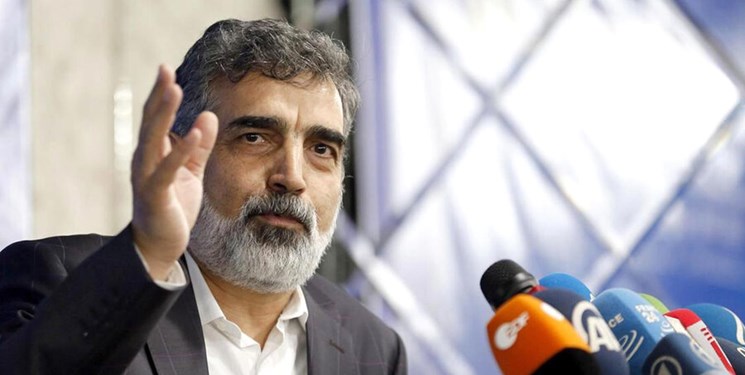Spokesman: Iran Continues Interactions with IAEA in Framework of Safeguards
Spokesman of the Atomic Energy Organization of Iran (AEOI) Behrouz Kamalvandi said that Tehran and the UN nuclear watchdog continue cooperation and interactions within the framework of the safeguards agreements.

Kamalvandi said that the country allowed replacement of damaged cameras at TESA Complex in Karaj after being assured of meeting three preconditions by the International Atomic Energy Agency (IAEA).
He named the three conditions as “judicial-security investigations into the dimensions of sabotage, condemnation of these sabotage acts by the IAEA and technical-security investigation of new cameras by Iran before installation”.
“Iran’s voluntary act to issue a license to replace these cameras is not in the form of a new agreement that was made after obtaining these three preconditions, and today (Sunday) the process of technical-security inspections of cameras by Iran is scheduled to begin.”
“The AEOI, as a specialized and technical institution, has continuous interactions with the IAEA within the framework of safeguards, and these interactions should not take a political form,” Kamalvandi said.
“In the media space and with the aim of psychological operations, the western and Israeli media are trying very hard to politicize Iran’s interactions with the IAEA, and unfortunately there are tendencies in the IAEA in this regard,” he added.
AEOI Head Mohammad Eslami said on Thursday that the recent agreement between Tehran and the UN nuclear watchdog about TESA Karaj complex will thwart the ill-wishers’ plots and help the Iranian negotiators.
“Ill-wishers of the Iranian nation and the Zionists regularly resort to psychological warfare to claim that the International Atomic Energy Agency (IAEA) is not aware of Iran’s activities,” Eslami told reporters.
The AEOI seeks to neutralize such moves and foil the plots of the enemy so that the Iranian negotiating team in Vienna talks can reach their goal which is the removal of sanctions, he added.
Eslami referred to his recent meeting with Director-General of the IAEA Rafael Grossi, and said that previously, four issues related to the Karaj site had remained unresolved.
He added that it was necessary to continue talks with the IAEA in order to reach a common understanding and continue the IAEA’s monitoring.
According to him, new cameras will be installed at TESA Complex in Karaj following an agreement reached between AEOI and Grossi.
In the presence of Iranian security and judicial officials, answers will be provided to technical questions of IAEA inspectors who bring the new cameras, he said.
The perpetrators that had a hand in the terrorist incident of the Karaj site will also be identified, Eslami added.
Iran reached an agreement with the International Atomic Energy Agency to install the IAEA’s new cameras at TESA Karaj complex to remove misunderstandings about the country’s nuclear program amid the Vienna talks, a report said.
Iran voluntarily allowed the IAEA replace the damaged CCTV cameras at Karaj’s site with new cameras after reaching an agreement with the UN nuclear watchdog, Nournews, affiliated to Iran’s Supreme National Security Council (SNSC), had reported on Wednesday.
The report came after Iranian Foreign Minister Hossein Amir Abdollahian said on Wednesday that Tehran had reached a good agreement with the IAEA last night.
It added that Iran’s voluntary move was a bid to prevent the possible misunderstandings about the activities at the TESA Karaj brought up during IAEA Director General Rafael Grossi’s visits to Tehran in September and December.
Previously, in response to the IAEA’s request to replace the CCTV cameras damaged in the sabotage act of terrorism at the TESA Karaj, Iran had explicitly stated that it would not allow the cameras to be fixed or replaced before the technical and security inspections at the site by the relevant Iranian authorities are over.
Now, given the IAEA’s action in condemning the act of sabotage at the TESA complex and after the international agency agreed that the technical and security inspection of the cameras by the Iranian experts to be finished before fixing or reinstalling the CCTV cameras at the site, the Iranian side has allowed the IAEA to reinstall the cameras according to the agreement last night.
Nournews reported that the agreement is not in contradiction with the law approved by the Iranian lawmakers at the parliament in early December last year entitled “Strategic Action Plan to Lift Sanctions and Protect Iranian Nation’s Interests” because after IAEA installs new CCTV cameras at the TESA facility in Karaj, the Atomic Energy Organization of Iran (AEOI) will keep the recordings of the cameras and will not hand them over to the Agency.
Amir Abdollahian said on Wednesday that his country and the IAEA have reached a good agreement last night.
“Last night we reached a good agreement with the IAEA that could address some of the alleged concerns about Iran’s peaceful nuclear program,” the foreign minister said, addressing the Iranian ambassadors to the neighboring states in Tehran.
He added that the agreement will increase mutual cooperation between Iran and the IAEA.
Eslami had said on Tuesday that based on the nuclear agreement, TESA Karaj Complex is no subject to the safeguards agreement between Iran and the IAEA.
Karaj facility is an unresolved issue between Tehran and the IAEA and based on the text of the Joint Comprehensive Plan of Action (JCPOA), the TESA Karaj Complex is not subject to safeguards rules, Eslami told reporters.
Tehran’s relations with IAEA must be in line with the rules and regulations of the safeguards agreements and the Non-Proliferation Treaty (NPT), he added.
Some western media, specially the Zionist regime, can’t tolerate technological developments in Iran, Eslami said.
He added that the westerners and the Zionists resort to psychological operations and media propaganda to distort the image of Iran in the world, claiming that Iran is not committed to the NPT.







